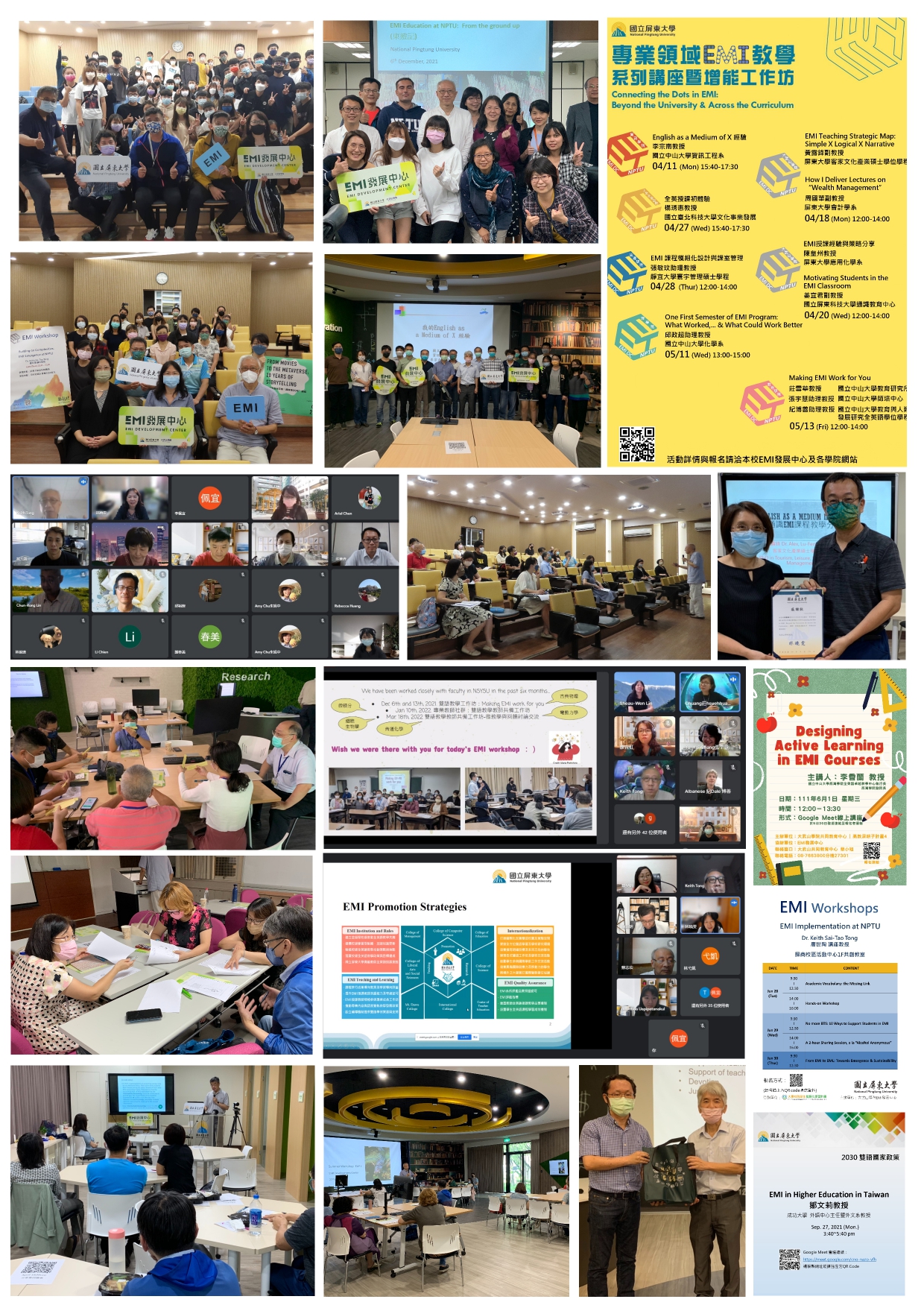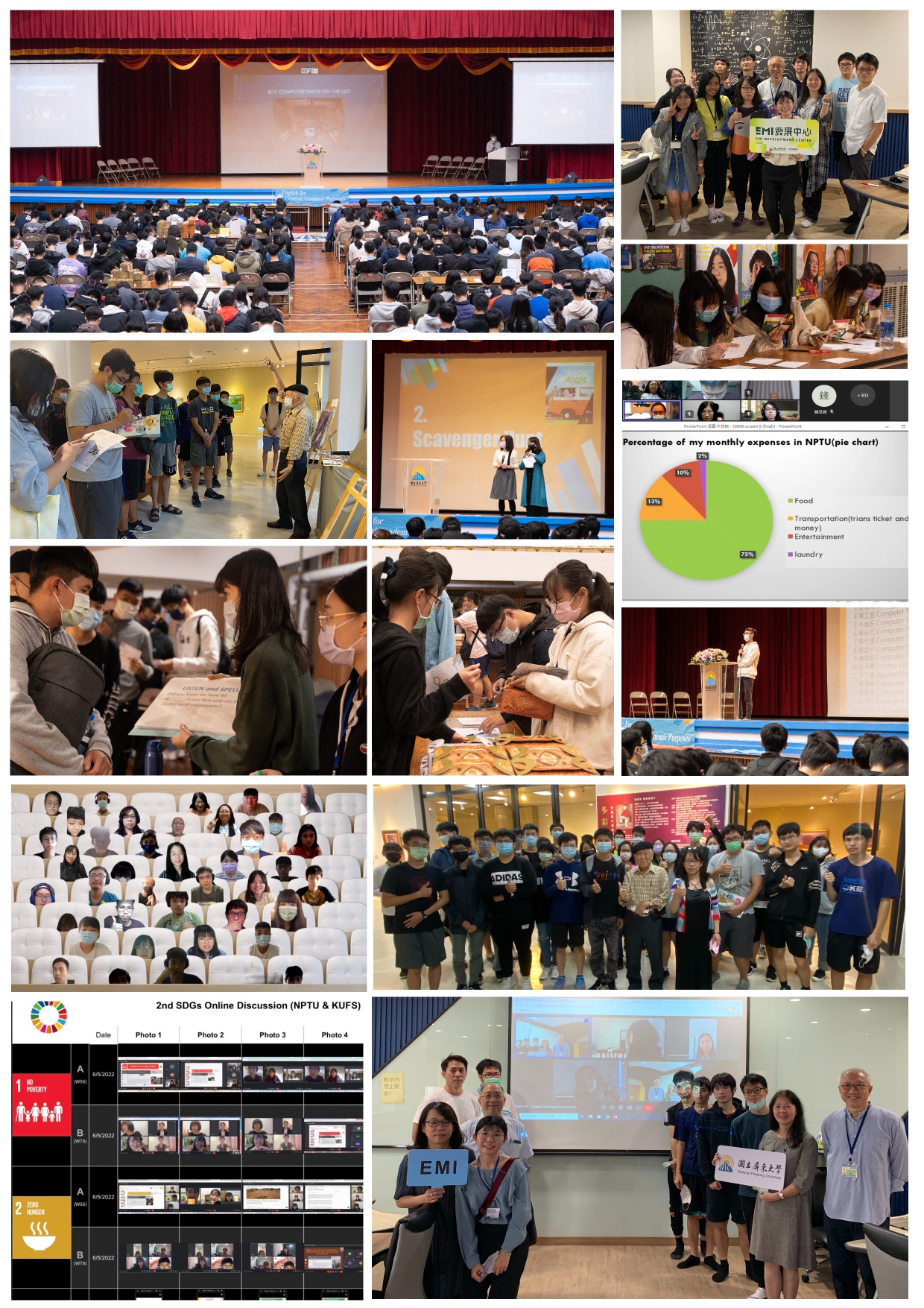Abstract
- Overview
In compliance with the Program on Bilingual Education for Students in College, National Pingtung University adopts gradual and progressive implementation of EMI education in the following aspects: university-wide, organization, teachers, students, courses, resource sharing, and interschool cooperation. In the 110 Academic Year, 14 classes of first-year students from the College of Science and College of Computer Science implemented the first-year “Basic Academic English” (BAE) in the general English courses. Based on the results of this implementation, in the 111 Academic Year, Basic Academic English (BAE) courses were offered to all the first-year students and second-year students with Specific Academic English courses (i.e., English for Humanity and Social Issues, English for Science Communication, English for Information Technology, English for Education, English for Business Management, etc.). Through the promotion of EMI curricular development and integration between the five colleges, we hope to cultivate first and second-year students’ academic English proficiency in order to bridge with EMI and English for the Workplace (EWP) courses. In addition, the EMI Development Center team cooperated with the five colleges to provide EMI teaching support, including organizing the EMI course promotion meetings and academic exchange between English teaching and subject scholars, by establishing mechanisms to encourage collaboration between English teachers and subject teachers, and comprehensively improved students' learning environment and quality in English medium.
- Organization
In order to better coordinate EMI implementation, Mount Dawu College established the EMI Development Center Office on November 30, 2021, which was later included in organizational regulations on August 1, 2022, with Professor Sai-Tao Tong, former Director of the Center for Language Education, Hong Kong University of Science and Technology, as a Chair Professor and the general consultant of the EMI teaching and learning in NPTU.
As of the 111 Academic Year, a total of four full-time teachers, one project English teacher, and one visiting scholar were recruited in the Mount Dawu College. The EMI Course Reward Scheme was introduced on May 7, 2015 and revised on June 9, 2022 in order to encourage teachers to offer EMI courses. To comprehensively evaluate the learning effectiveness of EMI courses, the EMI Development Center team drafted the EMI teaching evaluation questionnaire in February 2010 and implemented it in the second semester of the 110 Academic Year; formulated the EAP teaching evaluation questionnaire in April; implemented in the first semester of the 111 academic year. Starting from the 110 Academic Year, the EMI courses in the school has been regularly evaluated on the college-based curriculum, and the information on EMI course mapping will be established for all teachers and students in the university as the basis for course offering and course election, openly accessible to all stakeholders.
- Teachers
The EMI Development Center, collaborated with the Common Core Education Center, actively organize teacher empowerment activities to promote EAP and EMI teaching quality, ranging from the “EAP Curriculum Improvement & Effective Teaching” at the regular pre-semester professional development workshops, the “International Forum on Bilingual Education Policy in Higher Education” at the University Anniversary, “EAP and EMI course design consultation and class observation” during the semester, “Cross-institutional Professional Disciplinary EMI workshops”. In 2011, there were 98 EMI course teachers. Thirty-two of them completed 30 hours of teacher empowerment training to become the university’s EMI seed teachers, with a completion rate of 32.7% for those reaching the 30 hours’ benchmark. Furthermore, EMI Development Center also highly encouraged the establishment of teacher-student professional communities, the mechanism of EMI mentor and TA training in our university to share teaching resources and foster positive teaching and learning experiences.
- Students
In the 110 Academic Year, a total of 8 English-related competitions were held in the university. Students participated in a total of 26 English-related activities, including lectures on improving English ability, with a total of 1,138 students participating. To improve students’ listening and reading skills, an independent learning platform (FUNDAY) was adopted. In the 110 Academic Year, a total of 2,140 students used the platform, spending at least 12 hours on independent learning on the FUNDAY platform. The EMI Development Center team recruited TAs to increase students’ interest to speak English, and organized FUNDAY Online tutoring activities. A total of 321 students participated online. In order to review the learning performances of first-year students’ basic academic English proficiency, a display showcase event was held at the end of the semester, to complement EAP teaching evaluation questionnaire. Although only 17 students were able to join study-abroad program due to the pandemic. Students could still interact with each other through online cross-border learning initiatives, such as “SDG Collaborative Online International Learning”, organized in cooperation with Kyoto University of Foreign Studies.
- Courses
To strengthen students' English proficiency, starting from the "Basic Academic English" in the 110th academic year, we have been gradually improving students' comprehensive language communication skills in listening, speaking, reading, and writing. We focus on English productive skills in our curricula, breaking away from traditional approach to English learning, by evolving from "learning" to "using". Each college has also started All-English EAP courses. For example, College of Science started offering “Technical English” course in the first semester of the 110 Academic year. In response to the needs for fluent English proficiency and professional communicative competence in international communication, an all-English EWP micro-credit course “From Business Case Analysis to Business Communication” was also available for students and faculty.
- Resource sharing and interschool cooperation
In recent years, our school has actively expanded bilingual education exchanges and cooperation with other tertiary institutions in the southern Taiwan (e.g. National Sun Yat-sen University, National Cheng Kung University, National University of Kaohsiung, and Wenzao Ursuline University of Languages); 25 international sister schools via online meetings; and 8 multinational companies through industry-university cooperation initiatives.
- Explain how the school completes the self-assessment, including how the school level assists the implementing unit in the self-assessment assignment, how the self-assessment process works, and the suggestions given by the self-assessment consultees.
Our school regularly holds monthly school-level executive report meetings, where EMI implement is a prioritized work item in each college and the deans of each school would report the progress of in their EMI-related activities. 18 supervisory meeting reports have been documented in the 110 academic year on EMI implementation and management projects, with a total of 29 EMI meetings. In order to review the implementation in the university, the EMI Development Center team conducts monthly internal work meetings, evaluates the performance indicators of each aspect of the plan through the P-D-C-A process, reviews the difficulties faced, and proposes solutions. Institutional Research and Development Center regularly analyzes the effectiveness of the school's ESP/EMI courses. EMI planning and implementation will be to be included in the university's 112-116 university development plan as a key item in the blueprint for National Pingtung University's future development. The Center will introduce performance indicators for comprehensive review the university's effectiveness in the improvement of EMI quality and quantity.

